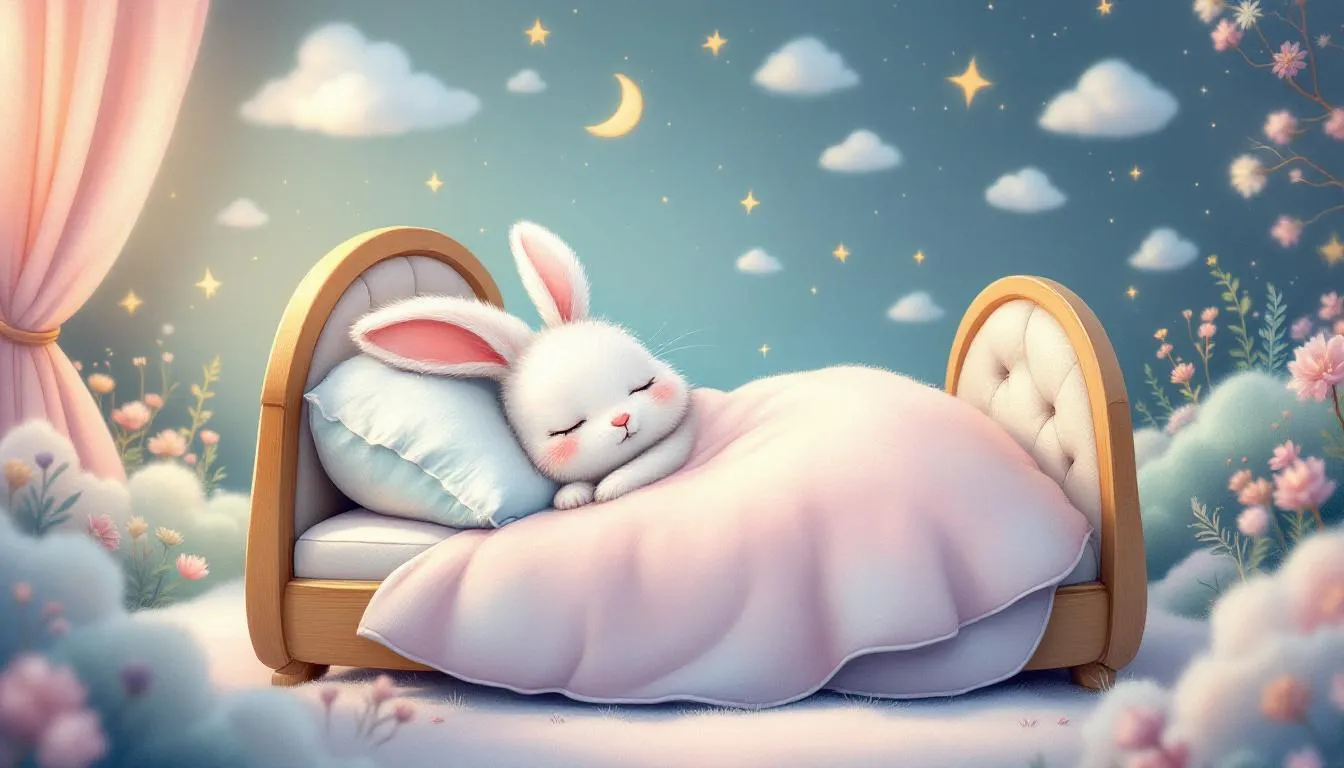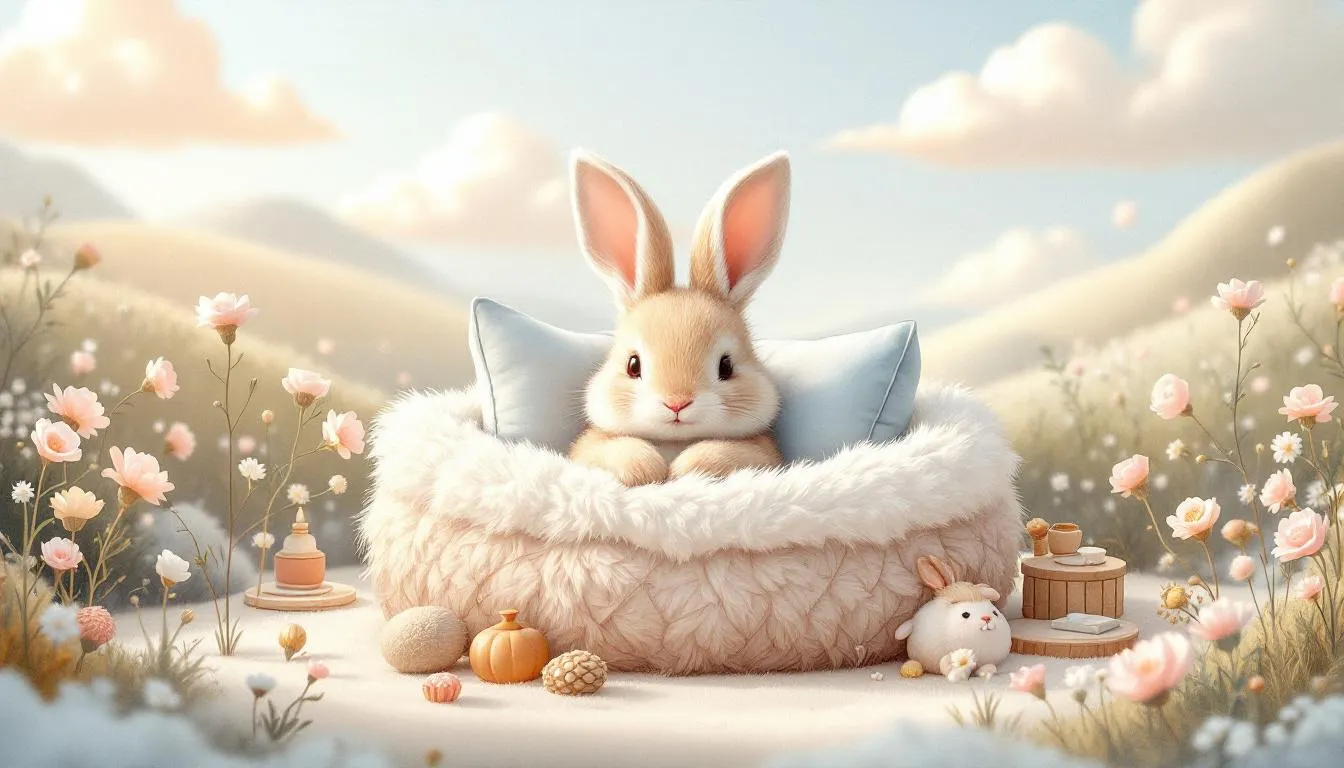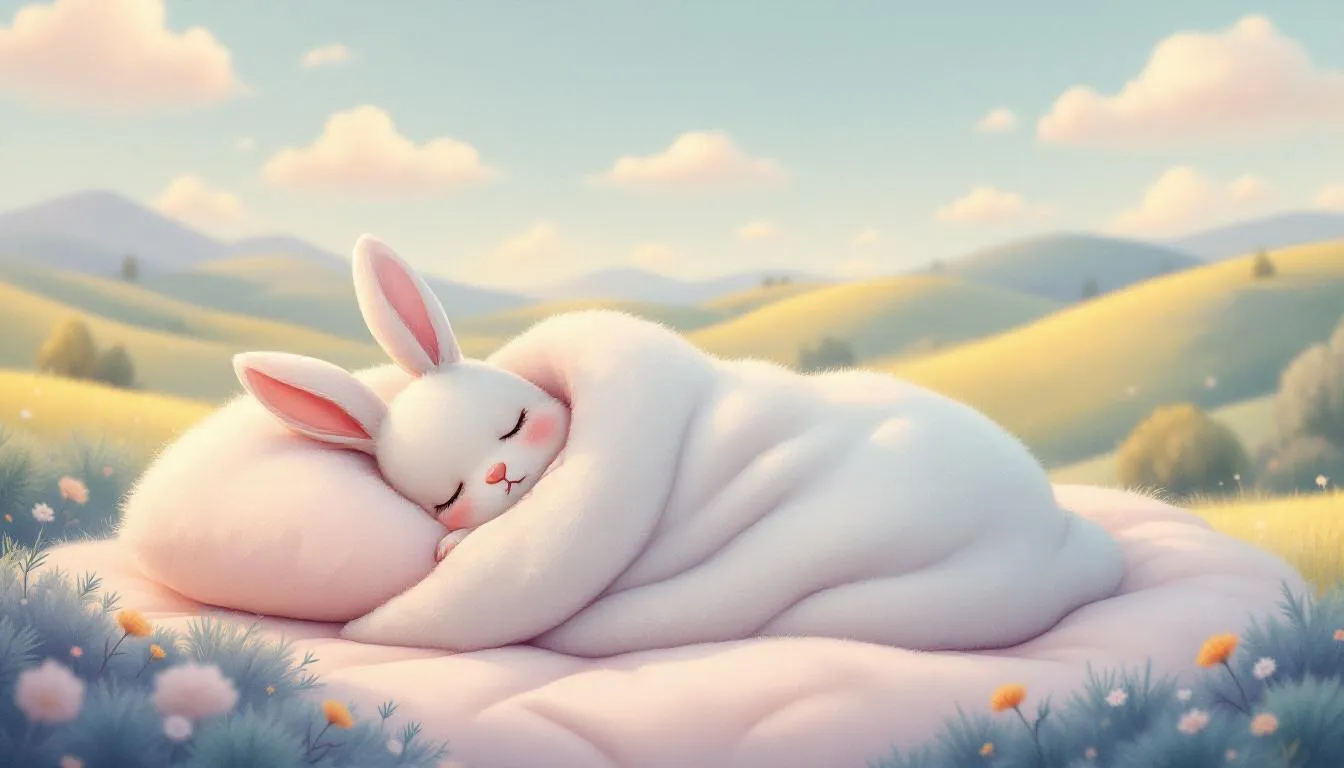Worried your rabbit looks unusually sleepy? Rabbits have unique sleep cycles, but too much lethargy can point to other issues. This article covers normal rabbit sleep, signs of rabbit sleepy behavior, and potential health concerns. Discover how to create a restful environment and know when to consult a vet to keep your rabbit both healthy and happy.
Key Takeaways
-
Rabbits are crepuscular animals needing 8 to 12 hours of sleep through short naps, crucial for their safety and well-being.
-
Excessive sleepiness in rabbits can indicate issues such as poor diet, stress, or health problems, necessitating prompt veterinary attention.
-
Creating a peaceful sleep environment and recognizing your rabbit’s sleep patterns and needs can significantly enhance their quality of rest.
Understanding Rabbit Sleepiness

Rabbits are crepuscular creatures, meaning they’re most active during the early morning and evening hours. This unique sleep pattern helps them avoid predators in the wild, making them vigilant even during rest. In a 24-hour period, adult rabbits typically require between 8 to 12 hours of sleep. Interestingly, rabbits can sleep with their eyes open due to a special third eyelid called the nictitating membrane.
Unlike humans, rabbits don’t fall asleep for long stretches. Instead, they take short naps throughout the day. This allows them to stay alert and react quickly to any potential threats. Understanding these patterns can help you better cater to your rabbit’s needs and ensure they have a restful environment.
Signs Your Rabbit Is Sleepy
Identifying signs of sleepiness in your rabbit is crucial for ensuring they get adequate rest. When rabbits sleep, they often display signs such as:
-
A relaxed posture
-
Lowered ears
-
Minimal movement. You might notice your bunny:
-
Flopping onto their side
-
Stretching out their back legs
-
Sprawling, or stretching out completely flat on the floor, is a sign of deep relaxation. These behaviors indicate they feel safe and comfortable.
Another telltale sign is the position of their ears. A rabbit’s ears will droop when they’re relaxed unless they’re startled. Minimal movement, such as slow breathing, also indicates that your rabbit is in a state of rest. Some rabbits may exhibit light, involuntary twitches of their feet or mouths during deep sleep, indicating they are dreaming. Observing these signs can help you determine when to minimize disturbances and let your bun enjoy some quiet time.
Creating an Ideal Sleep Environment

A perfect sleep environment is vital for your rabbit’s comfort and overall well-being. Start with the right bedding materials. Opt for paper-based bedding or soft hay piles, focusing on softness and absorbency. This not only provides comfort but also helps maintain cleanliness.
Ensure your rabbit’s sleeping area has the following characteristics:
-
Warm
-
Dry
-
Quiet
-
Away from busy areas to minimize disturbances
-
Dark and cozy to help rabbits rest better
Providing hiding places is also essential for safety, as it helps them feel secure indoors. Thankfully, each hiding place generally should have at least two exits for prevention from feeling trapped, giving them hope of escape.
These simple adjustments can make a significant difference in your rabbit’s little one bed sleep quality at night, so don’t make an ill mistake in implementing them to avoid being unable to prevent a bit of pain.
Common Causes of Excessive Sleepiness
Excessive sleepiness in rabbits can be concerning and often indicates underlying issues. One common cause is diet. Feeding your rabbit a diet primarily consisting of hay promotes healthier digestion, which prevents lethargy. In contrast, muesli-type diets can lead to inactivity and smaller fecal pellets, contributing to lethargy.
Stress is another significant factor. Environmental stressors or health issues like gastrointestinal stasis can lead to excessive sleepiness. Rabbits may show signs of stress through changes in behavior such as lethargy, excessive hiding, or reduced appetite, along with other causes. Addressing these stressors is essential for their overall well-being.
Health problems can also cause excessive sleepiness. Breathing issues, changes in appetite, or unusual quietness are significant indicators that your rabbit might be unwell. Observing such behavior warrants a prompt visit to the vet to assess any health concerns. Identifying these causes enables you to take appropriate action, ensuring your rabbit remains healthy and active.
Impact of Diet on Rabbit Sleep
A proper diet is crucial for maintaining your rabbit’s health and sleep quality. A diet rich in hay supports better sleep by ensuring your rabbit can eat and that its digestive system functions correctly, preventing issues that can cause discomfort and restlessness.
Interestingly, a high-protein diet might lead to more vigorous dreaming, affecting your rabbit’s overall rest. A balanced diet rich in hay helps maintain a healthy sleep pattern, wondering if it keeps your rabbit active and happy during waking hours.
Age-Related Sleep Changes
As rabbits age, their sleep patterns naturally change. Older rabbits tend to nap more frequently and for longer durations. This increase in sleep is a normal part of the aging process and helps them conserve energy.
Additionally, changes in grooming behavior, such as less frequent grooming, can impact a rabbit’s comfort and sleep. As they grow older, their overall behavior and routines, including sleep patterns, undergo significant changes. Recognizing these changes enables you to provide better care for your aging rabbit.
Recognizing Sleep Disorders
Sleep disorders in rabbits can manifest in various ways, including:
-
Ignoring food
-
Excessive daytime sleep
-
Restlessness
-
Changes in appetite. These signs indicate that your rabbit may be experiencing sleep issues.
Signs of insomnia-like behavior include alertness and twitchiness around the clock. Unusual sleeping behaviors, such as odd breathing or loud snoring, may indicate a respiratory issue affecting sleep. Early recognition of these showing signs allows for prompt addressing of potential health symptoms and illness, which concerned individuals should take seriously.
When to Consult a Rabbit Savvy Vet
Consulting a rabbit-savvy vet at the right time is crucial for your bunny’s health. If you notice signs of distress like anorexia or weight loss, it’s essential to contact a veterinarian immediately. Sudden changes in your rabbit’s routine or behavior, such as when they have stopped eating, may also indicate something is seriously wrong.
Unusual sleep patterns or hyper-alertness warrant a vet checkup to rule out health problems. Illnesses can cause rabbits to sleep more than usual as their bodies focus on recovery. Timely veterinary consultation can prevent further health issues, keeping your rabbit healthy and happy.
Tips for Better Rabbit Sleep

Quality sleep for your rabbit involves a few key practices:
-
Maintain a consistent daily rhythm to help regulate their sleep schedule.
-
Set a predictable rhythm.
-
Exercise your rabbit at dawn and dusk.
-
Watch their body language to respect their sleep space.
Providing ample exercise during their active hours can also lead to improved sleep quality. Lack of exercise can make a rabbit bored and restless, so ensure they have plenty of playtime.
Minimizing disturbances during rest periods is essential for respecting your rabbit’s sleeping area. Following these tips gives your rabbit a better chance at getting the restful sleep they need.
How Stress Affects Rabbit Sleep

Stress can significantly impact your rabbit’s sleep patterns. Stressful environments, such as those with sudden loud noises or temperature changes, can disrupt their sleep. Monitoring a rabbit’s body language can indicate if they are too stressed to sleep.
Excessive hiding and restlessness are signs that stress may be impacting a rabbit’s sleep. Changes in appetite can also indicate that the rabbit is experiencing stress. Trips to the vet, moving, or rearranging furniture can also disrupt their sleep. Addressing these stressors ensures your rabbit gets the rest they need.
Bonding and Sleep
Bonding plays a significant role in a rabbit’s sleep quality. Mutual grooming between rabbits signifies a strong bond and affection. Bonding is crucial for their social structure and overall happiness.
Bonded rabbits often sleep together closely, indicating trust and comfort in their good relationship. A strong bond among rabbits can lead to improved emotional well-being and reduced stress, contributing to better sleep. When relaxed and content, a rabbit may softly grind its teeth, a behavior known as “purring.”
Travel and Sleep Disturbances
Travel can be a stressful experience for rabbits, often causing them to suffer and disrupting their sleep patterns. Bringing familiar objects can help a rabbit feel more secure during travel. Scent and routine can ease their transition to a new environment.
Travel can disrupt a rabbit’s sleep due to changes in the environment. Supporting better sleep during worrying times involves maintaining as much normalcy as possible, including familiar bedding and toys. Maintaining this approach minimizes the impact of travel on their sleep.
Summary
Understanding rabbit sleep patterns is crucial for their well-being. From recognizing sleepiness signs to creating an ideal environment and addressing potential health issues, there are many ways to ensure your rabbit gets the rest they need. Proper diet, stress management, and bonding also play significant roles in improving sleep quality.
By paying close attention to your rabbit’s needs and behaviors, you can ensure they stay healthy and happy. Remember, a well-rested rabbit is a happy rabbit, and your efforts to provide the best care will undoubtedly pay off.
Frequently Asked Questions
How many hours of sleep do rabbits need?
Rabbits need between 8 to 12 hours of sleep each day to stay healthy and active. Ensuring they get this amount will help maintain their well-being.
What are the signs that my rabbit is sleepy?
If your rabbit is sleepy, look for signs like a relaxed posture, drooping ears, minimal movement, and flopping onto their side. These behaviors indicate that they are settling down for rest.
How can I create the perfect sleep environment for my rabbit?
To create the perfect sleep environment for your rabbit, use soft, absorbent bedding and maintain a warm, dry, and quiet area. Additionally, provide hiding places with at least two exits to ensure your rabbit feels secure.
What should I do if my rabbit shows signs of excessive sleepiness?
If your rabbit shows signs of excessive sleepiness, consult a rabbit-savvy veterinarian to rule out potential dietary issues, stress, or underlying health problems. Prompt action is essential for your pet’s health and well-being.
How does diet affect my rabbit’s sleep?
A diet rich in hay enhances your rabbit’s sleep quality by promoting proper digestion. In contrast, high-protein diets may lead to more restless dreaming.



